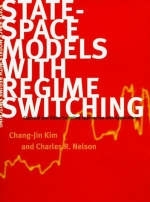
State-Space Models with Regime Switching
Classical and Gibbs-Sampling Approaches with Applications
Seiten
1999
MIT Press (Verlag)
978-0-262-11238-3 (ISBN)
MIT Press (Verlag)
978-0-262-11238-3 (ISBN)
- Titel ist leider vergriffen;
keine Neuauflage - Artikel merken
Both state-space models and Markov switching models have been highly productive paths for empirical research in macroeconomics and finance. This book presents advances in econometric methods that make feasible the estimation of models that have both features.
Both state-space models and Markov switching models have been highly productive paths for empirical research in macroeconomics and finance. This book presents recent advances in econometric methods that make feasible the estimation of models that have both features. One approach, in the classical framework, approximates the likelihood function; the other, in the Bayesian framework, uses Gibbs-sampling to simulate posterior distributions from data.
The authors present numerous applications of these approaches in detail: decomposition of time series into trend and cycle, a new index of coincident economic indicators, approaches to modeling monetary policy uncertainty, Friedman's "plucking" model of recessions, the detection of turning points in the business cycle and the question of whether booms and recessions are duration-dependent, state-space models with heteroskedastic disturbances, fads and crashes in financial markets, long-run real exchange rates, and mean reversion in asset returns.
Both state-space models and Markov switching models have been highly productive paths for empirical research in macroeconomics and finance. This book presents recent advances in econometric methods that make feasible the estimation of models that have both features. One approach, in the classical framework, approximates the likelihood function; the other, in the Bayesian framework, uses Gibbs-sampling to simulate posterior distributions from data.
The authors present numerous applications of these approaches in detail: decomposition of time series into trend and cycle, a new index of coincident economic indicators, approaches to modeling monetary policy uncertainty, Friedman's "plucking" model of recessions, the detection of turning points in the business cycle and the question of whether booms and recessions are duration-dependent, state-space models with heteroskedastic disturbances, fads and crashes in financial markets, long-run real exchange rates, and mean reversion in asset returns.
Chang-Jin Kim is Bryan C. Cressey Professor in the Department of Economics at the University of Washington. Charles Nelson is Ford and Louisa Van Voorhis Professor in the Department of Economics at the University of Washington.
| Reihe/Serie | State-Space Models with Regime Switching |
|---|---|
| Verlagsort | Cambridge, Mass. |
| Sprache | englisch |
| Maße | 152 x 229 mm |
| Gewicht | 612 g |
| Themenwelt | Wirtschaft ► Volkswirtschaftslehre ► Ökonometrie |
| ISBN-10 | 0-262-11238-8 / 0262112388 |
| ISBN-13 | 978-0-262-11238-3 / 9780262112383 |
| Zustand | Neuware |
| Haben Sie eine Frage zum Produkt? |
Mehr entdecken
aus dem Bereich
aus dem Bereich
Buch | Hardcover (2012)
Westermann Schulbuchverlag
CHF 44,90
Schulbuch Klassen 7/8 (G9)
Buch | Hardcover (2015)
Klett (Verlag)
CHF 29,90
Buch | Softcover (2004)
Cornelsen Verlag
CHF 23,90


